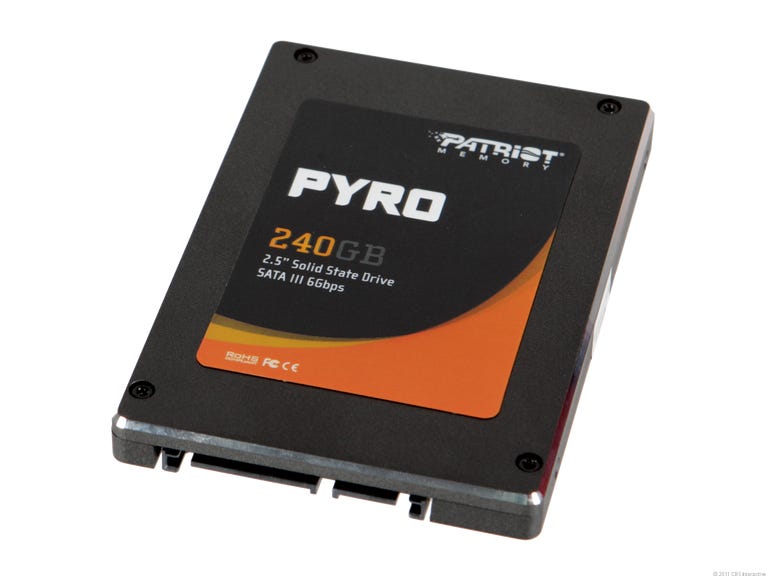 Why You Can Trust CNET
Why You Can Trust CNET Patriot Memory Pyro solid-state drive review: Patriot Memory Pyro solid-state drive
Patriot Memory Pyro solid-state drive
The Patriot Memory Pyro is somewhat of a downgrade from the Patriot Wildfire in terms of both price and performance. The drive was slightly slower in our testing and is among the more expensive SATA 3 (6Gbps) solid-state drives on the market. That said, it's still about 90 cents per gigabyte cheaper than its brother and will offer significant improvement to your computer's performance when used as a replacement for the boot drive. Note, however, that you might not want to let the computer go into sleep mode when the drive is used. In our testing, the drive would occasionally dismount when waking up from sleep mode, causing a blue-screen error. If you can live with that, the Patriot Memory Pyro still makes a decent investment.
The Good
The Bad
The Bottom Line
Design and features
| Drive type | Internal drive |
|---|---|
| Connector options | SATA 3 (6Gbps), SATA 2, SATA |
| Available capacities | 60GB, 120GB, 240GB |
| Product dimensions | 9mm thick, 2.5-inch standard |
| Capacity of test unit | 240GB |
| OSes supported | Windows, Mac, Linux |
The Pyro looks basically the same as the Wildfire except for the different label on its top. The drive comes in the standard 2.5-inch, 9mm-thick design. This means it will work in most, if not all, instances in which a regular hard drive of the same design would be used, such as inside a laptop computer. The drive supports different RAID configurations in case you want to add multiples of them together to increase performance or to protect data from drive failure.
Unlike the Wildfire, the Pyro doesn't come with a 3.5-inch drive bay converter. This means you'll have a harder time fitting it inside a desktop computer. However, this is not really a big deal, as we find that you can just let an SSD sit around inside the computer as long as you don't move the system around too much, since it has no moving parts.
Like the Wildfire, the Pyro supports the latest SATA 3 (6Gbps) standard but also works with the popular SATA 2 (3Gbps) standard and even the original SATA controller. To get the most out of it, obviously, it's recommended to use SATA 3.
We tried the Pyro with all popular operating systems, including Windows, Linux, and Mac OS X, and it worked as intended. Under Windows 7 64-bit, we did find that once in a while the 240GB drive would dismount when the test computer was coming out of the sleep mode, causing a blue-screen error. In this case, we needed to turn the computer off and restart it again. Since this didn't happen consistently and the tested drive used the latest firmware (version 3.2.0), we assumed that this would only happen with certain motherboards. We recommend that you don't use sleep mode with the drive and instead turn the computer off completely. With this drive, your computer should just take a few seconds to boot up anyway. Still, we hope that this will be resolved via a firmware update.
Cost per gigabyte
The Pyro, though cheaper than the Wildfire, isn't one of the most affordable SSDs we've seen. In fact, at $1.79 per gigabyte (the 240GB version) or $1.67 per gigabyte (the 120GB version), it's more expensive than a few others that offer better performance. Note that the pricing used in this review is that of the current market and might change significantly.
Performance
The Patriot Memory Pyro performed decently in our testing and met our expectations considering the performance of the higher-tier and more expensive Wildfire. We tested the drive by copying a large amount of data both while using it as a secondary drive and while using it as the main (boot) drive of the test machine. In the former case, the drive can show its full throughput speed, and the latter represents what you'd see in normal daily usage.
When used as a secondary drive, the Pyro scored an average real-world copying speed of 190MBps, about 12MBps slower than the Wildfire. When used as the main and only drive of the test machine, the Pyro was slower, since it had to perform both reading and writing at the same time, and averaged 76.44MBps, which is once again about 12MBps slower than its big brother.
Nonetheless the drive helped speed up booting and shutdown for the test machine significantly compared with a traditional hard drive. On top of that we also noticed that applications, especially heavy ones such as games or Photoshop, took much less time to load.
In all, other than the sleep mode issue, we find the Pyro's performance makes it a worthy upgrade from any hard drive.
(Shorter bars indicate better performance)
| Shutdown | Boot time |
(Longer bars indicate better performance)
| As secondary drive | As OS drive |
Service and support
Patriot backs the Pyro (like the Wildfire) with a three-year warranty, which is decent and standard for most SSDs, though not as generous as the five-year warranty of the OWC Mercury Extreme Pro 6G. On the company's Web site, there's a page dedicated to the drive with support-related information and firmware downloads.
Conclusion
The Patriot Memory Pyro offers decent data rates and helps improve a computer's overall performance significantly when used as the main drive hosting the operating system. Its rather high cost and some stability issues, however, make it a little hard for us to recommend it to everyone.


